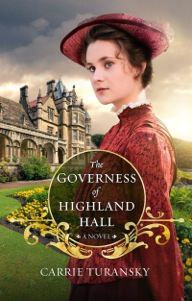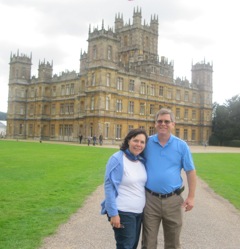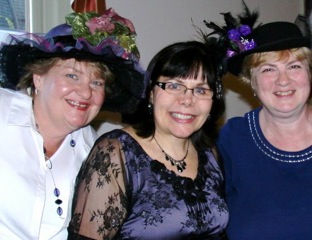I’ve wished I could write more words in my novel each week. So I was delighted, when I asked author Carrie Turanksy to share writing tips, she passed along tips to help writers be more productive.
 Carrie’s historical romance, The Governess of Highland Hall, released last week. It’s set in England in the early 1900s. Beyond Downton Abbey lovers, I recommend Carrie’s novel for those who enjoy intriguing interaction among diverse characters.
Carrie’s historical romance, The Governess of Highland Hall, released last week. It’s set in England in the early 1900s. Beyond Downton Abbey lovers, I recommend Carrie’s novel for those who enjoy intriguing interaction among diverse characters.
Carrie: In my search to stay focused, silence my internal editor, and increase my writing productivity I’ve developed these eight tips. I hope they will help you write more words!
1. Outline the scene first.
Before you start writing take five minutes and outline your scene. Write out 1 – 3 pages by hand. Choose your point of view character and think through what you want to happen. Jot down a few lines of dialogue. This gets your creative juices flowing, and I’ve found the scene seems to come together much more quickly when I start typing from these notes. Knowing where you are going with the scene, can really free you up creatively and help you move ahead more quickly.
2. Give yourself permission to write fast and messy.
Learning how to resist the internal editor takes determination, self-discipline and practice, but it’s a skill you can learn. You have to refuse to listen to those questions that pop into your mind and just keep writing. Self-talk can be very helpful. I tell myself, I don’t have to write it perfectly the first time. I don’t have to follow all the rules. I can evaluate this later, delete what’s bad and keep what’s good. I just need to get it down. It’s also helpful to remember that you can only edit and revise what you’ve written. It’s okay if it’s awful. You will fix it when it’s time to edit and revise.
3. Write with instrumental music playing in the background.
I recently saw an informal survey that found those who listened to music while writing were able to write more words per day than those who didn’t. I like to write with instrumental movie soundtracks playing in the background. Some of my favorite soundtracks are Prince of Tides, The Cider House Rules, Little Women, and Downton Abbey for my present English series.

Carrie and Scott visited Highclere Castle where Downton Abbey is filmed last summer on a research trip.
4. Set a timer.
Set your timer for fifteen minutes. Tell yourself you will focus and write for that long. Keep writing and moving ahead in your story without going back to review, revise, or correct anything. Then take a short break and set the timer again. You’ll be surprised how much you can accomplish in short periods of time like this. This is a great way to train yourself to focus and stay in the creative mode.
5. Set a word count goal.
Word count goals can be motivating and helpful guides. Some writers like to set daily word count goals, but I like the weekly goals. That gives me a little more flexibility for a day I may have to go to the doctor or have another appointment. I know if I meet my goal each week, then I’ll finish my book on time. That relieves some of the pressure and helps me stay in the creative mode. It also helps me be accountable to stick with it when I feel like reorganizing the spices in my kitchen cabinet or playing around on Pinterest.

Carrie recently hosted a book launch tea party in honor of the release of The Governess of Highland Hall.
6. Write at your most productive time of the day.
When are you the most productive and creative? Some authors are morning people, others work best late at night. Others find that their best writing happens after they’ve been writing for a certain amount of time. So do a study and keep track of the time you write, where you write, and the word count for each session. See if you can find your most productive time of the day and the best locations for you to write. Then set aside that time to write, and don’t allow email, Facebook or Pinterest to eat up your best writing time. Turn off your email program so it doesn’t ding every time you receive an email, and use your less productive times of the day to check email and social media.
7. Wear earphones.
Earphones are a great way to block out noise as well as pipe in your favorite music. Even when I am not listening to music, I sometimes use them. They block out some of the noise and distractions, and they let my family know I am working, then they are less likely to interrupt me unless it’s something important.
8. Reward yourself for reaching your goals.
Why wait until you’ve finished your book to enjoy a reward? Set several short-term goals and celebrate when you reach them. Do something you enjoy when you meet your weekly word count goal or the halfway point in your book. Take breaks to enjoy a walk, go shopping, meet a friend for lunch, or play ball with your kids or grandkids. Enjoy life and take in God’s blessings so you will be ready to give them out as you write.
Which of Carrie’s tips will you try next week? I’m thinking #8.
 Carrie Turansky is the award-winning author of eleven inspirational romance novels. She and her husband, Scott, who is a pastor, author, and speaker, have been married for thirty-five years and make their home in New Jersey. They often travel together on ministry trips and to visit their five adult children and three grandchildren. Carrie leads women’s ministry at her church, and when she is not writing she enjoys spending time working in her flower gardens and cooking healthy meals for friends and family. She loves to connect with friends:
Carrie Turansky is the award-winning author of eleven inspirational romance novels. She and her husband, Scott, who is a pastor, author, and speaker, have been married for thirty-five years and make their home in New Jersey. They often travel together on ministry trips and to visit their five adult children and three grandchildren. Carrie leads women’s ministry at her church, and when she is not writing she enjoys spending time working in her flower gardens and cooking healthy meals for friends and family. She loves to connect with friends:
My website: http://carrieturansky.com
Facebook: https://www.facebook.com/authorcarrieturansky
Printerest: http://pinterest.com/carrieturansky/
Twitter: https://twitter.com/carrieturansky



 RSS - Posts
RSS - Posts



All great tips, Carrie. I’ve used most of them and they work very well, especially writing the bones of the scene in longhand first. Unfortunately, I’m not as disciplined as I need to be when it comes to using that or the timer, etc. I find number two to be my biggest obstacle, though. Ugh!
Sandra, I have trouble with 2 also. I love to edit.
Great advice, thank you so much for sharing! LOVE the timer aspect, and the ‘permission to write messy’ advice. You’re so right – you can’t edit what isn’t written! Great post, Zoe and Carrie! Love, hugs and blessings!
I’ve heard that listening to classical music helps order our thoughts. Maybe I should listen to classical when I’m trying to make a point with my dear husband.
These are terrific ideas. I will be trying many of them.
Carrie gave us such a nice package that there’s got to be at least one helpful tip in there for every writer.
Great tips! I’m bookmarking this page 🙂 I believe they will work for non-fiction writing as well.
Hi Friends, thanks for sharing your thoughts about these tips. It is hard to be disciplined in our writing . . . but it’s a skill we can keep working on. Anne, you are right, these tips work for non-fiction as well as fiction. Blessings and Happy Writing!
I’ve spent so much time lately editing that I’ve lost track of the need to keep writing! These are excellent suggestions. I think I’ll start with the timer, knowing I can at least afford that much time for the creative side of my writing, then get back to editing.
Jane, I’m looking forward to seeing the fruits of your timer. You’ve done so much critiquing for me.
Hi Jane, It’s very wise to separate the times you are editing from the time you are trying to write your rough draft. When you try to do both at the same time it is like driving with your foot on the brake! It takes discipline to not edit and keep pushing ahead, but that is key to getting more writing done. I hope the timer idea is a help!
Hi Carrie – Great tips! I need to get some instrumental music going. This is the first time I’ve heard that it increases word count. Outlining – no way, no how for me. I’m a SOTP writer. Any planning or ideas happen in my head. If I try to get them into an outline, it stops the creative process cold. Blessings, Susan 🙂
Hi Susan, I tried listening to classical a while back, and it did seem to help. I usually like silence. I think I’ll play my classical playlist tomorrow.